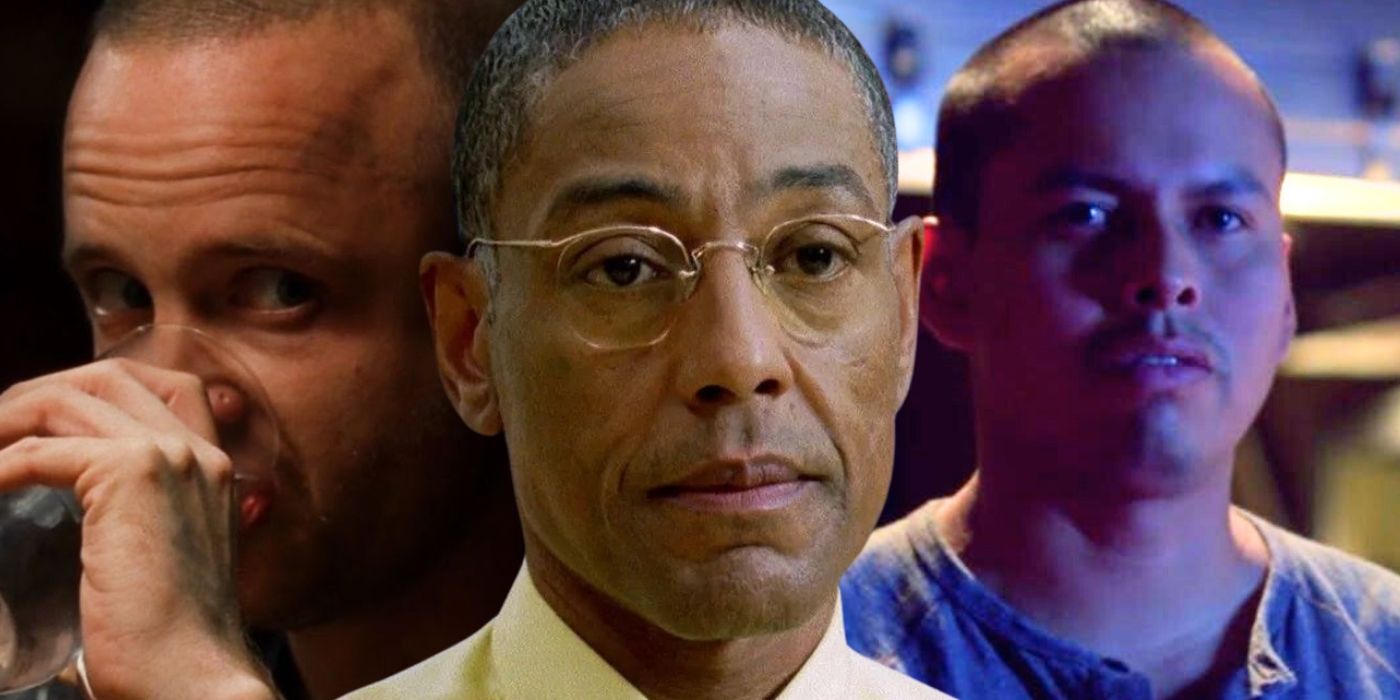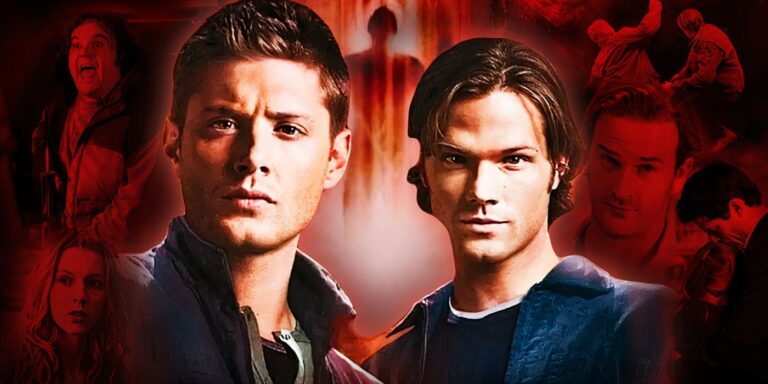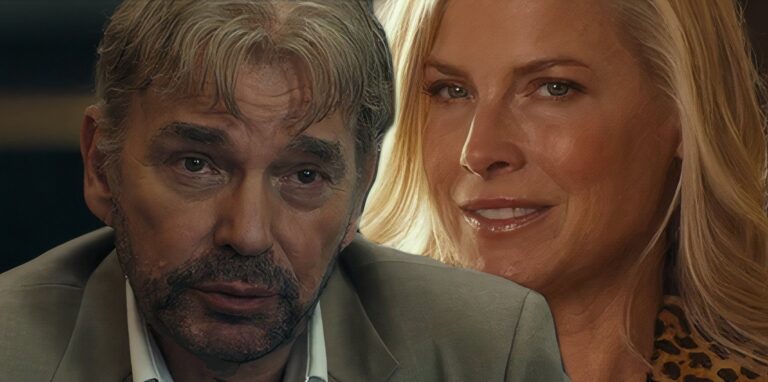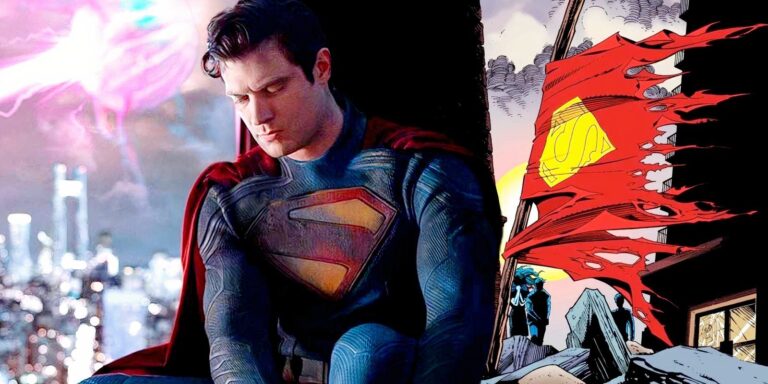Breaking Bad didn’t fully explain why Gus killed Victor instead of Walt and Jesse at the beginning of season 4, and the answer reveals much about the formidable villain. Victor (Jeremiah Bitsui) served as Gustav Fring’s (Giancarlo Esposito) henchman when the character made his series debut in Breaking Bad season 2. Like Mike Ehrmantraut (Jonathan Banks), Victor was a violent enforcer of Gus’ drug empire and made sure everything went smoothly for his boss. Unfortunately for Breaking Bad‘s Victor, Gus — the man he worked for and trusted with his life — ended up slitting his throat.
There’s no shortage of murder and unexpected moments in Breaking Bad, and Gus Fring is the cause of much of it. However, that didn’t make Gus killing Victor in season 4’s episode 1, “Box Cutter”, any less shocking. Breaking Bad‘s box-cutter scene with Gus and Victor is remembered for its visceral display of violence. However, this only really scratches the surface of the real meaning behind why Gus killed Victor. Looking back at the scene, it stands out as a defining moment for Gus Fring and cements him as the greatest villain in the Breaking Bad universe.
Why Victor Was Killed In Breaking Bad
Gus Showed That No Amount Of Loyalty Makes Up For Mistakes
Gus killing Victor in Breaking Bad is even more chilling given their history. As revealed in the prequel series, Better Call Saul, Victor worked for Gus long before the events of Breaking Bad. By season 3, Victor watched over the meth superlab where Walter White (Bryan Cranston) and Jesse worked as part of Gus’ operation. When Gale Boetticher (David Costabile), another chemist, was introduced into the fold, Walt worried that he would be killed and replaced with the newcomer.
Walt devised a plan to kill Gale, making him the sole person to lead the meth cooking, but Jesse wound up doing the dirty work. Jesse shot and killed Gale at his apartment before Victor arrived to stop him. In the Breaking Bad season 4 premiere, “Box Cutter,” Walt and Jesse were held hostage so that Gus could punish them for their actions. While waiting for Gus to arrive at the lab, Victor cooked his own batch of meth to prove that he studied Walter White’s meth formula.
Rather than target Walt and Jesse, Gus entered and cut Victor’s throat with a box cutter before telling his employees to get back to work. Gus was unhappy with the fact that Victor was spotted at the scene of Gale’s murder by neighbors, essentially putting the entire operation at risk. Ultimately, however, Gus killing Victor, his longtime ally, held a deeper meaning. As with everything Gus Fring does, it was a cold, calculated move.
Gus Sent A Message To Walt & Jesse By Killing Victor
Victor’s Death Showed Just How Dangerous Gus Truly Was
Why did Gus kill Victor with such brutality? Although Gus didn’t directly threaten Walt or Jesse following Victor’s Breaking Bad execution, he no longer had to. The real reason Gus killed Victor in such a way is that it sends a crystal clear message to the two men: if they put the operation at risk, then Gus wouldn’t hesitate to kill either one of them as well.
Though Jesse was the one to pull the trigger and kill Gale, Victor clumsily and needlessly allowed himself to be connected to the murder. Gus’ decision to kill his old ally was justified in his mind when he saw a composite sketch of Victor hanging in a police station later that season. Others may have learned to cook meth at potentially the same level as Walt and Jesse, but Gus was well aware that they had the highest quality of the product.
This is another reason Gus killed Victor instead of Jesse: Walt and Jesse’s partnership made them critical to the operation in Gustav’s eyes. In Breaking Bad season 5, Victor’s death was mentioned by Walt while talking to Jesse. He stated that Gus killed Victor because he “flew too close to the sun” and that greediness caught Gus’ attention. In hindsight, Gus probably should have put more thought into taking Walt and Jesse out of the equation.
The Box Cutter Breaking Bad Episode Was Almost Unplanned
The Brutal Death Of Victor In Breaking Bad Was A Last-Minute Decision
Breaking Bad showrunner Vince Gilligan has always been open about the creative process behind the show. An amazing behind-the-scenes reveal about Breaking Bad season 4 from Gilligan came in 2011. Speaking to AV Club, Vince Gilligan explained that the infamous box cutter episode — and Gus murdering Victor — wasn’t planned until season 4 was already in production.
“[Season 4]
has been a little closer to the way we broke season three, which is to say we knew we had a little drama going between Walt and Gustavo, we knew we had all the ingredients for a major game of chess, as it were. But as to exactly how this game of chess would play out, we didn’t have that completely nailed down at the beginning of this season.”
It wasn’t only the moment itself that evolved naturally during the creative process, but many of the directorial decisions for how Gus murdered Victor played out were almost impromptu too. Vince Gilligan was especially particular about the sound design for the scene — a choice which was made remarkably in the moment, considering how poignant the effect was. As Gilligan revealed:
“It’s a very quiet scene, and yet what’s interesting about it is it’s quiet only on one side of that equation. Walt actually speaks wall to wall throughout the scene, as he’s basically arguing for his life and then toward the end begging for his life. People remember that as a very quiet scene but actually there’s lots and lots of dialogue.”
Notably, while entire sections of Walter White’s dialogue were removed and Gus said almost nothing throughout, the impact was increased. Gilligan had a few theories on why it worked so well:
”
You really have two choices in a scene like that: Either the guy’s screaming and ranting, and in a sense that defuses tensions — lets the air out of the balloon, dramatically — or you have a guy who’s not giving you anything, who’s very hard to read and yet who’s putting on a raincoat. And that in itself, his action of putting on the rain jacket, speaks volumes. We felt like that was an eerier, more dramatic way to go.”
Gus Killing Arturo In Better Call Saul Shows A Consistent Approach To Murder
The Breaking Bad Spinoff Establishes How Brutal Gus Has Always Been
In Better Call Saul season 4, the spinoff dives deeper into Breaking Bad territory through certain reveals, including how Gustav Fring has always used murder to control people he would rather keep alive. Back in Better Call Saul season 3, Nacho plots to take over Hector’s position in the Salamanca drug operation by switching Hector’s medication with fake placebo capsules, causing Hector to have a stroke.
Though the cartel bosses assign Nacho and Arturo to replace Hector, Gus gets Victor to follow and investigate the two. In Better Call Saul season 4, episode 2 “Breathe,” Gus confirms that Nacho is responsible for Hector’s stroke. When Nacho and Arturo strong-arm their way into getting more drugs than they were supposed to from Gus’ facility, Gus ambushes them and suffocates and kills Arturo with a plastic bag.
While Victor and Tyrus make Arturo’s death look like a gang killing, Gus informs Nacho that he is aware of how Nacho put Hector Salamanca in a wheelchair, but that the Salamancas do not. Similar to why Gus killed Victor in Breaking Bad, Gus killed Arturo in Better Call Saul to exert full control over Nacho, who’s more useful to him alive.
Better Call Saul‘s insight into Gustav Fring paints a truly horrific figure — one who eerily kills not just as a form of punishment, but as a threat of punishments yet to come. While Victor’s Breaking Bad execution happened very differently from Arturo’s death in Better Call Saul, they reveal Gus’ pattern of using brutal deaths to keep his people in line. Moreover, Gus telling Nacho that Hector wasn’t supposed to die yet reveals how much thought Gus has put into his long-term plans.
Gus Murdering Victor Has More Context Thanks To Lalo
The Death Of Lalo Proved Just How Brutal Gus Fring Is
Breaking Bad‘s Victor execution is even better after Gus killed Lalo in Better Call Saul, which shows that, despite Gus’ facade of level-headedness and respectfulness, he has always been the most dangerous person in his crew. Apart from making Victor look even smaller compared to the rest of Gus’ hit list, how Gus outsmarted the guerilla-like tactics of Lalo Salamanca further contextualizes how he could kill so quickly and without hesitation.
In many ways, Lalo was crucial to keeping Gus grounded. Underneath Lalo’s chaotic and charismatic exterior lies a level of methodical thinking that rivaled even Gus, and only failed because of Lalo’s inherent hubris. After studying, dealing with, and disposing of the horror villain that is Better Call Saul‘s Lalo Salamanca, Gus was smarter for the experience. Just as Gus killed Lalo, killing Victor in Breaking Bad was the easiest and fastest way for Gus to ensure what was best for himself and the organization.
Gus Killing Victor Is Still His Most Ruthless Moment
Even Compared To Everything Else He Did, The Boxcutter Episode Was Brutal
Better Call Saul continued to explore Gus Fring as a character, adding new elements to him and even giving a deeper understanding of his life outside the drug empire. While the prequel show also featured more examples of Gus’ ruthlessness and brutality, as with his defeat of Lalo and the murder of Arturo, Gus killing Victor remains his most shocking act. One of the best qualities of Gus Fring is his ability to hide in plain sight, and it causes a lot of people to underestimate him.
While it was clear he didn’t rise to power without resorting to violence when necessary, Gus killing Victor is a chilling moment that shows the rage and cold-bloodedness that hides under the unassuming persona he adopts. Once he executed Victor in that fashion, the mask was removed and the audience would never look at Gus the same way again. Though he still did shocking things on Breaking Bad and Better Call Saul after the murder of Victor, it felt less impactful because the viewers now knew just what Gus was capable of.
This Moment Perfectly Encapsulates Gus Fring
Victor’s Death Shows Gus’ Strengths And Weaknesses
By the time Gus Fring dies on Breaking Bad, he had established himself as the show’s best antagonist to go up against Walter White. However, Victor’s death may have been the moment that truly cemented that reputation and it serves as a perfect display of everything that made the character so effective. It speaks to his approach to business, the danger he presents, and his desire for revenge, which eventually leads to his downfall.
Gus was someone who operated in plain sight for so long because of his ability to keep a level head. He does not like to associate himself with unpredictable people or introduce an element of chaos into his business. It makes him an outlier in the drug world and vastly different from a loose cannon like Tuco Salamanca. Even when killing someone is necessary, Gus goes about it in a practical and unemotional way, thinking about the mess and the best means of carrying out the deed. His calmness makes the moment all the more chilling.
Victor is one of the few people Gus is shown to personally kill in the series, choosing to get others to do his dirty work. However, this particular murder shows the determination he has when his mind is made up. Walter White has shown a brilliant ability to lie and talk his way out of many situations. However, as Walt is spending the entire scene talking, Gus is preparing for the inevitable. He walks into the room knowing what he is going to do and immediately sets about preparing for this. This are no words that will dissuade him.
However, the scene also shows Gus’ weakness. As much as he doesn’t show emotion at the moment, he is clearly angry. Even if Victor was seen at Gale’s apartment, he did not need to kill him and could have found a solution. He wanted to scare Walt and Jesse, but he was also angry. He simply took his anger out on Victor because he was the one he could kill. Though it might not seem like it, Gus lost control in that moment and Walt recognizes his anger as a flaw, exploiting it later in Breaking Bad.








